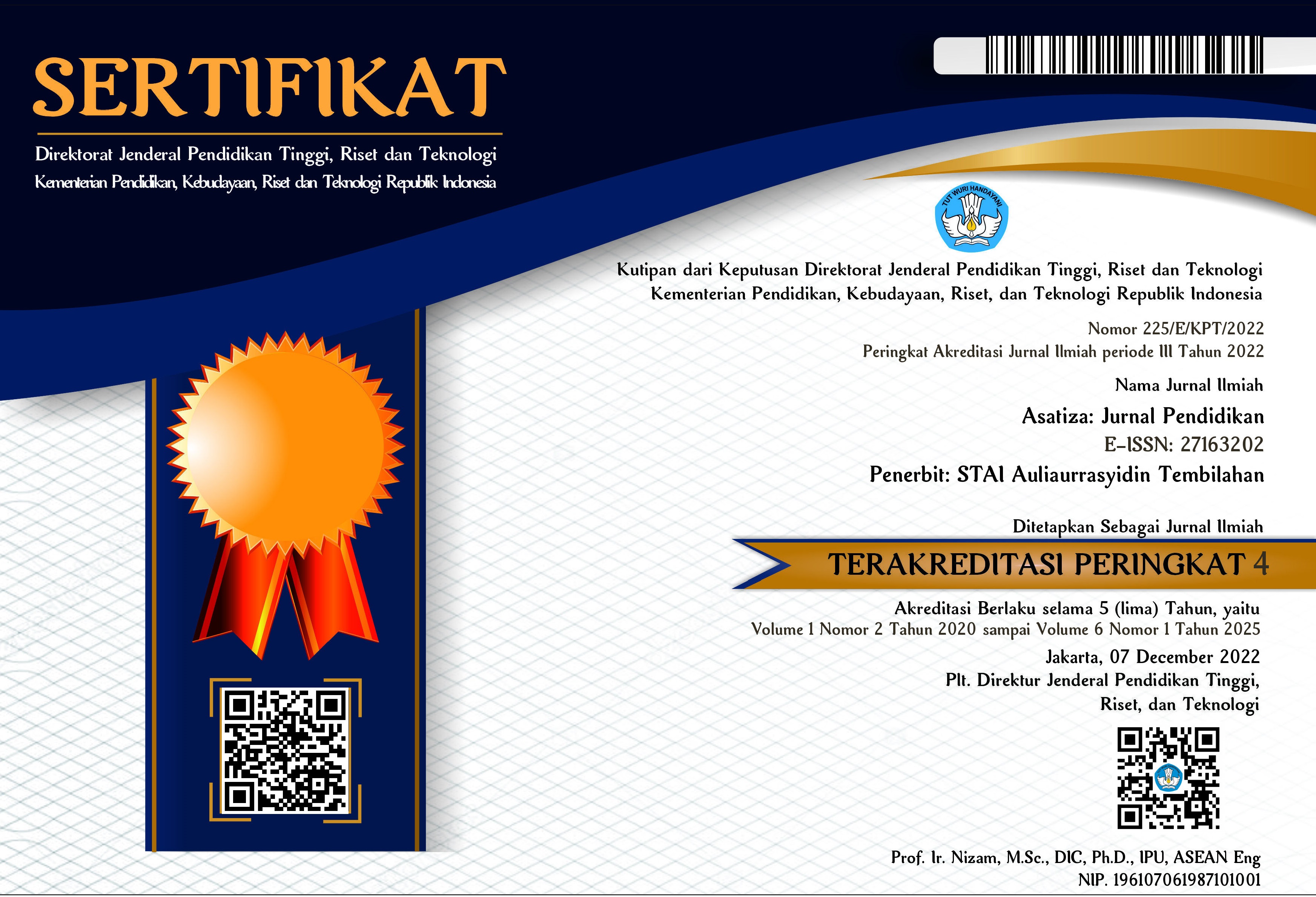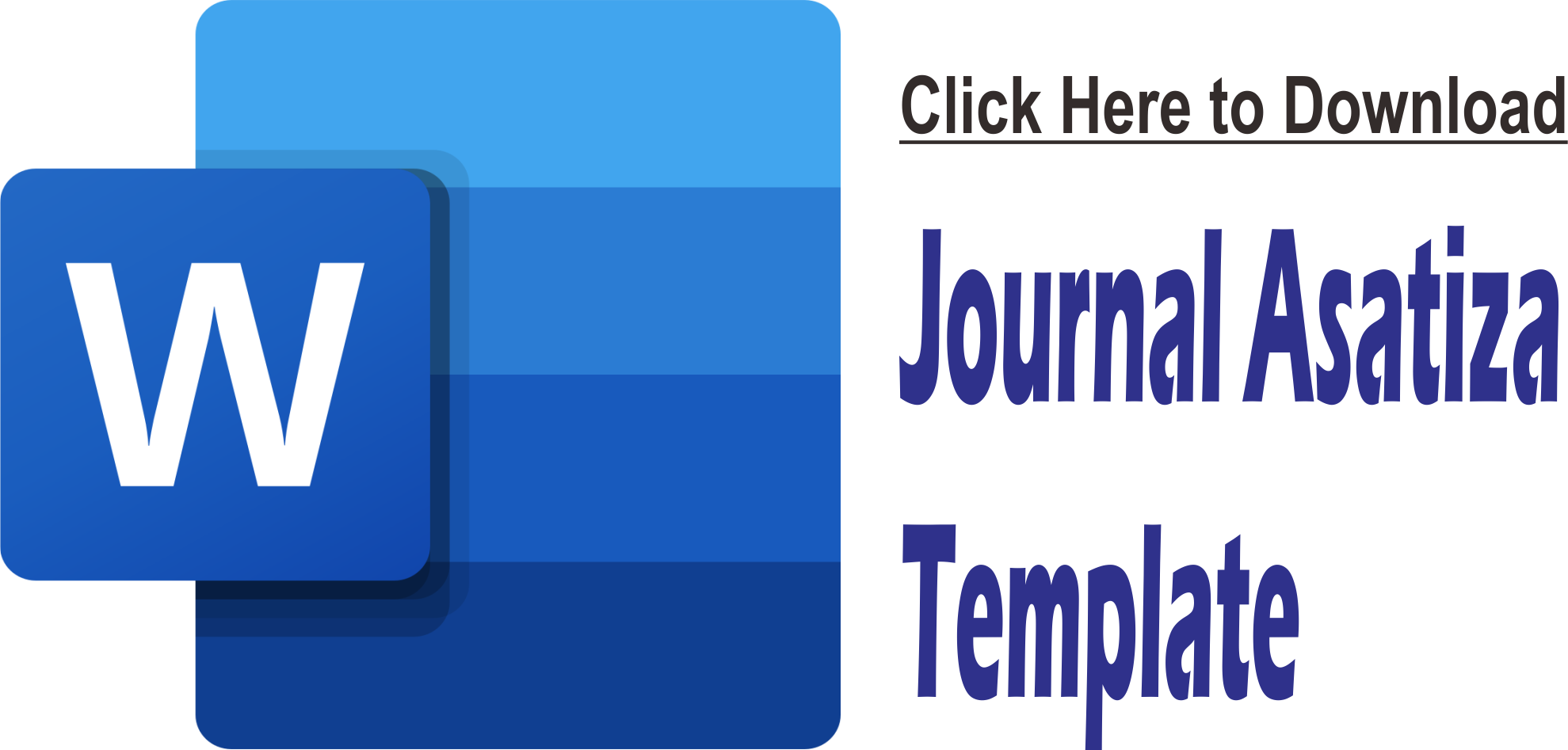Pengaruh Kewibawaan Guru Fikih terhadap Aktivitas Belajar Siswa di Madrasah Tsanawiyah Miftahul Huda Seberang Tembilahan Kecamatan Tembilahan
DOI:
https://doi.org/10.46963/asatiza.v4i1.904Keywords:
Authority, Learning Activities, StudentsAbstract
This study aims to determine whether there is an influence of Jurisprudence Teacher Authority on Student Learning Activities. This type of research is quantitative research. The number of samples in the study amounted to 71 people. Data collection techniques through questionnaires and documentation. The data analysis technique was carried out by means of a simple linear regression statistical test. Based on data analysis on variable X, namely the Authority of the Fikih Teacher, the result is 97% and is categorized as Very Strong, because it lies in the Interval Criteria of 81% -100%. Furthermore, based on data analysis on the Y variable, namely Student Learning Activities, the results obtained were 97% categorized as Very Strong, because it lies in the Interval Criteria of 81% -100%. Based on data analysis on variables X and Y, namely the effect of the authority of the Fikih teacher on student learning activities, the results obtained are F count ≥ F table = 69.5 ≥ 3.99, so reject Ho and accept Ha means that there is a positive and significant influence between the authority of the Fikih teacher on Student Learning Activities.
Downloads
References
Ahmadi, A., & Uhbiyati, N. (2015). Ilmu Pendidikan. Jakarta: Rineka Cipta.
Aunurrahman. (2014). Belajar dan Pembelajran. Bandung: Alfabeta.
Danim, S. (2010). Pengantar Kependidikan. Bandung: Alfabeta.
Efendi, D. (2015). Dasar-Dasar Ilmu Pendidikan. Padang: Universitas Negeri Padang.
Hafid, A., Ahiri, a., & Haq, e. (2014). Konsep Dasar Ilmu Pendidikan. Bandung: Alfabeta.
Hamalik, O. (2009). Dasar-dasar Pengembangan Kurikulum. Bandung:: Remaja Rosdakarya.
Hamdani. (2011). Strategi Belajar Mengajar. Bandung: CV Pustaka Setia.
https://kwriu.kemdikbud.go.id/unesco/tentang-unesco/.
Kodir, A. (2011). Strategi Belajar Mengajar. Banfung: CV Pustaka Setia.
Muliawan. (2015). Ilmu Pendidikan Islam. Jakarta: Rajawali Pers.
Prayitno, & Manullang, B. (2011). Pendidikan Karakter dalam Pembangunan Bangsa. Jakarta: Grafindo.
Rusman. (2012). Belajar dan Pembelajaran Berbasis Komputer. Bandung: Alfabeta.
Sardiman. (2016). Interaksi dan Motifasi Belajar Mengajar. Jakarta: Rajawali Pers.
Sugiyono. (2015). Metode Penelitian dan Pengembangan. Bandung: Alfabeta.
Sukmadinata, N. S. (2012). Metode Penelitian Pendidikan. Bandung: PT. Remaja Rosdakarya.
Surya, M. (2015). Psikologi Guru Konsep dan Aplikasi. Bandung:: Alfabeta.
Syafril, & Zen, Z. (2007). Dasar-dasar Ilmu Pendidikan. Depok: Kencana.
Taniredja, T. (2016). Guru yang Profesional. Bandung: Alfabeta.
Tu’u, T. (2008). Peran Disiplin Pada Perilaku dan Prestasi Siswa. Jakarta:: Grafindo.
Yanti, F. A., & dkk. (2018). Teori Aplikasi Model Cooperative Research Project Based Learning di Perguruan Tinggi. Yogyakarta: CV. Gre Publishing.
Downloads
Published
Issue
Section
License
Copyright (c) 2023 Abd. Syahid, M. Ilyas, Zulkarnainsyah Zulkarnainsyah, Suriya Hidayat

This work is licensed under a Creative Commons Attribution-ShareAlike 4.0 International License.
Authors who publish with this journal agree to the following terms:
1. Copyright on any article is retained by the author(s).
2. The author grants the journal, right of first publication with the work simultaneously licensed under a Creative Commons Attribution shareAlike 4.0 International License that allows others to share the work with an acknowledgment of the work’s authorship and initial publication in this journal.
3. Authors are able to enter into separate, additional contractual arrangements for the non-exclusive distribution of the journal’s published version of the work (e.g., post it to an institutional repository or publish it in a book), with an acknowledgment of its initial publication in this journal.
4. Authors are permitted and encouraged to post their work online (e.g., in institutional repositories or on their website) prior to and during the submission process, as it can lead to productive exchanges, as well as earlier and greater citation of published work.
5. The article and any associated published material is distributed under the Creative Commons Attribution-ShareAlike 4.0 International License











2.png)



